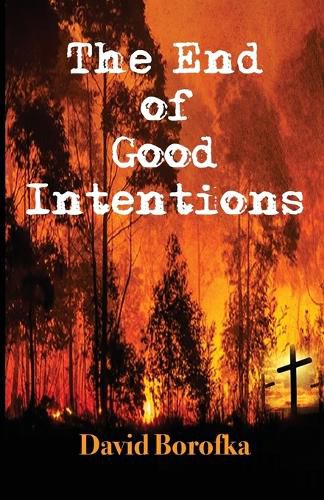Readings Newsletter
Become a Readings Member to make your shopping experience even easier.
Sign in or sign up for free!
You’re not far away from qualifying for FREE standard shipping within Australia
You’ve qualified for FREE standard shipping within Australia
The cart is loading…






This title is printed to order. This book may have been self-published. If so, we cannot guarantee the quality of the content. In the main most books will have gone through the editing process however some may not. We therefore suggest that you be aware of this before ordering this book. If in doubt check either the author or publisher’s details as we are unable to accept any returns unless they are faulty. Please contact us if you have any questions.
"History Is a funny thing," Michael Wayte says in The End of Good Intentions. "We don't always know what's significant. We hardly ever know what's significant. What was important then might not be so now; what's important now might not be later." Beginning with a fire and a gruesome incident of self-sacrifice, the novel presents a Christian college in transition, from its midcentury Presbyterian origins to a more strident and politicized Evangelicalism.
Set between the mid-1970s and today, the novel moves back and forth through the turbulence of recent American history, charting the course of characters such as Michael Wayte, the pre-ministerial student who becomes the owner of a foothill bar; Leah Green, the Jewish student who finds herself a stranger in a strange Christian environment; Walter Book, the gay English professor, who doesn't know he's gay; and Eivar Mortenson, whose actions at the beginning of the novel become the catalyst for all that is to come.
In The End of Good Intentions, David Borofka examines the gap between desire and emptiness, conviction and extremism, those who believe absolutely in the certitude of their perspective and those who live on the outer margins of doubt and uncertainty.
$9.00 standard shipping within Australia
FREE standard shipping within Australia for orders over $100.00
Express & International shipping calculated at checkout
This title is printed to order. This book may have been self-published. If so, we cannot guarantee the quality of the content. In the main most books will have gone through the editing process however some may not. We therefore suggest that you be aware of this before ordering this book. If in doubt check either the author or publisher’s details as we are unable to accept any returns unless they are faulty. Please contact us if you have any questions.
"History Is a funny thing," Michael Wayte says in The End of Good Intentions. "We don't always know what's significant. We hardly ever know what's significant. What was important then might not be so now; what's important now might not be later." Beginning with a fire and a gruesome incident of self-sacrifice, the novel presents a Christian college in transition, from its midcentury Presbyterian origins to a more strident and politicized Evangelicalism.
Set between the mid-1970s and today, the novel moves back and forth through the turbulence of recent American history, charting the course of characters such as Michael Wayte, the pre-ministerial student who becomes the owner of a foothill bar; Leah Green, the Jewish student who finds herself a stranger in a strange Christian environment; Walter Book, the gay English professor, who doesn't know he's gay; and Eivar Mortenson, whose actions at the beginning of the novel become the catalyst for all that is to come.
In The End of Good Intentions, David Borofka examines the gap between desire and emptiness, conviction and extremism, those who believe absolutely in the certitude of their perspective and those who live on the outer margins of doubt and uncertainty.